Scott McCaughey (pronounced Mc-Coy) is the leader of The Young Fresh Fellows, an often humorous alt-rock band that formed in the 1980’s, and the pop collective The Minus 5, an often more-serious venture which formed in 1993. From 1994-2011 he also played with R.E.M., both live and in the studio.
McCaughey is also a member of The Baseball Project with Peter Buck, Steve Wynn, and Linda Pitmon. This interview was for the Baseball Project show at Velvet Jones in Santa Barbara on 9/7/14. It was originally scheduled to be at the Lobero Theatre, which is why there are several references to that. The interview was done by phone on 8/27/14. (L. Paul Mann photo)
Jeff Moehlis: I saw you guys when you came to Santa Barbara three years ago at the Mercury Lounge.
Scott McCaughey: Yeah, that was a really fun show. Crazy.
JM: What do you remember about that show?
SM: We all remember it very fondly, actually. The stage was big enough for, like, two of us, I think [laughs]. We had the bass amp on the floor in front of the front door, and I think Robert Lloyd was sitting in with us at that show, and may well do this time as well – he had his keyboard down on the floor in front of the stage. It was really tight and funky, but we had such a great time. The crowd was awesome and it was packed. It was a less professional sound system than we normally would have, but we had an absolute blast. The people in the club were great, and we loved it. Everybody was like, “We should go back to that place this time”, but we got the great offer to play at the Lobero Theatre so we’re pretty excited about that.
JM: One nice thing about the Lobero, you will fit onstage a little better.
SM: [laughs] That’s good.
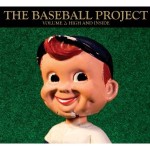
JM: One might argue that baseball is not a particularly obvious topic for rock and roll songs. Why baseball? What was the draw of that?
SM: It’s simply because we love baseball and we’re kind of insane fans. We’re baseball geeks, that’s the reason. And, you know, obviously our biggest passion is playing music and writing songs, so Steve and I just thought we should try putting them together. That way we can maybe get into some games for free, and stuff like that [laughs]. It doesn’t have anything to do with other sports or anything, it’s just that we’re super-passionate about baseball. But of course number one is music, so it just seemed like a fun thing to put them together, and it’s been great.
JM: Do you find that audience members who aren’t baseball fans still go for the Baseball Project songs?
SM: Yeah, I don’t think we’ve alienated any of our fans. I think whether they like baseball or not, they’re really, really good songs. Even if they don’t necessarily understand the intricacies of what we’re talking about or trying to say, I think they can just enjoy it for the music. And really, speaking for myself at least, even if you don’t understand baseball you might understand the Baseball Project songs just as much as you understand my Minus 5 or Young Fresh Fellows songs [laughs]. It’s not like they’re absolutely obvious, necessarily. I think it works totally on a musical level.
For me, with lyrics, even if I don’t know what somebody is singing about, if I don’t understand necessarily, if I like the sound of the lyrics and the way the words roll together, then I’m happy. I don’t have to absolutely know exactly what’s going on in a song. But with Baseball Project songs, they are typically a little more story songs. We approach it sort of like folk-singing journalists, in a way [laughs]. Try and tell stories about all the great players and strange things that have happened in baseball.
JM: I’ve heard of studies that have been done that suggest that creativity is enhanced when you put restrictions on the creative process. In the context of you being in a band that only writes songs about baseball, do you think there’s any truth to that? By restricting your focus, does that lead to better material?
SM: I don’t know that it necessarily leads to better material, but it does sort of inspire songwriting for me. It is weird to have this narrowed focus, but it’s kind of like having an assignment or something. In a way, it feels easy to write songs about baseball, easier because you have that limit, you put that limit on yourself. To me, it feels more like having an assignment, but a fun one. I’m not necessarily talking about what a bummer my life is, or whatever [laughs]. Because it’s not a bummer, but still you write songs about what a bummer it is. But with baseball, some of the songs are very personal for Steve and I, but a lot of them are not at all. It’s something I’ve really enjoyed so far. I’ve enjoyed having that focus, that limit. I can still write songs about dead people and booze, you know, for my other bands [laughs].
JM: What’s your favorite team?
SM: The Giants are number one and I’m also a big A’s fan, and a Mariners fan because I spent many years in Seattle. But I grew up in the Bay Area, so the Giants first, then the A’s, then the Mariners.
JM: I’m one of the sad Chicago Cubs fans. What can I say? Maybe some day.
SM: Well, you know, they’ve got some good young players.
JM: Every year it’s like, “Maybe this is the year.”
SM: They could be really good in a couple years.
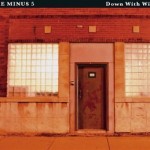
JM: I saw you more recently when you opened for Jeff Tweedy at the Granada Theatre last December. I know you have a history of working with him – you have the Down With Wilco album and so on. What’s it like working with him?
SM: Oh God, it’s awesome. We’ve been friends for such a long. I find it really inspiring doing stuff with him because he’s got so many ideas and he knows what he wants. We always have a great time working together. I had him do some stuff on the Minus 5 five record set that I put out of Record Store Day [called Scott the Hoople in the Dungeon of Horror]. I sent him five or six songs and asked him to play lead guitar on them. When he sent them back, when I heard them I had the biggest smile on my face because it was never at all what I expected [laughs]. And it was amazing. He confounded me at every turn, which was awesome.
I went out a couple of times to Chicago this year and worked on his record a little bit. It’s amazing, and that was such a great experience for me. I’m constantly impressed with the stuff he comes up with, as a musician and as a songwriter. And he’s really fun to hang out with because he’s hilarious [laughs].
JM: At that show, you did a song I really like that my notes say was “Elton John-style zombie song with lyrics like ‘Kill, kill the dead'”. Is that on the five album set that came out? I haven’t heard it except at the concert.
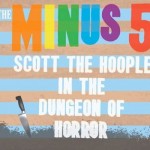
SM: Yeah, it is, it’s on that. And it’s not surprising you haven’t heard it because there were only 750 copies made, and it’s not up on iTunes or anything like that yet. I guess at some point I will do that, but I wasn’t really sure what kind of release we were going to do with it after the Record Store thing. And in true Scott McCaughey fashion, I haven’t done anything. It’s just sitting there.
But, yeah, that was a song called “Kill the Dead” that is on that five record set. It’s sort of inspired by reading the graphic novels of The Walking Dead. I’ve seen a little bit of the show, but I don’t have cable so I haven’t seen that much of it. But my wife and I are avid readers of the graphic novels when they come out. I was kind of just putting myself in the position of one of the people in one of those post-zombie apocalypse situation. It’s a very plaintive song [laughs]. People laugh when they hear it, but it’s supposed to be pretty sad I guess.
JM: I think it nicely straddled that boundary between outrageous and serious.
SM: Yeah, for sure.
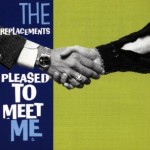
JM: Going further back in your career, the Young Fresh Fellows toured with The Replacements in the 1980’s. What was that like?
SM: Well, you know, I can tell you that we did play in Santa Barbara with The Replacements. We did a Santa Barbara show. I can’t remember the name of the venue [La Casa de la Raza], but it was a big all-ages hall. It was really funny actually [laughs]. I remember that show specifically because our guitar player at the time, Chuck Carroll, he didn’t think it was a very good show that we played, and we walked offstage and [Paul] Westerberg was standing there watching us, and he was like, “That was awesome! That was great!” And Chuck was just like, “Fuck you”, because he thought it was terrible [laughs].
We had a great time, as you can imagine, touring with them. There were lots of hijinks, and some amazingly great shows and some absolutely horrible shows [laughs]. Probably because of the way we sort of spurred each other on in the consumption of alcohol, and trying to be the biggest idiots basically [laughs]. We tried to out-idiot each other.
The worst show was one of the times we played in Portland, where it was just a travesty. Neither band could play at all. The Replacements came up during our set and just kicked us off and started playing. And they threw all our clothes into the audience. You know, we threw a couch out the window, we pulled a chandelier out of the ceiling. We had a great time, I guess, but it was actually kind of desperate. We were just all feeling horrible. It was really a rip-off for the fans, I will say that much [laughs]. It was absolutely horrible. And I think that’s why they put “Sorry Portland” etched in the grooves on their next record.
But overall we had a great time. You know, some shows were better than others, certainly. A lot of fun was had.
JM: You were a part of the Seattle music scene before grunge took off, and then when it took off. What, in your mind, was the good, the bad, and the ugly about grunge?
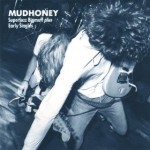
SM: I guess it brought a lot of attention to the city, and in some ways that was good. People discovered some of the other bands, too, probably peripherally, like The Posies and The Walkabouts and The [Young Fresh] Fellows to some degree, although we never got too popular around the rest of the country. You know, we did alright. Some great bands came out of it. Mudhoney is an awesome band. They’re still really, really great. To me, they’re kind of the quintessential grunge band. I’m sure they’d be sick of hearing themselves called that. They also were influenced by Northwest rock from the 60’s like The Sonics and The [Fabulous] Wailers and stuff like that, as were The Fellows. For me, they were kind of the really great band that came out of that. Obviously Nirvana, too, was spectacular. You definitely got some great music out of it.
The bad stuff was a lot of people moved to Seattle from all over and started their own grunge bands. Those were horrible [laughs]. Except Pearl Jam. Pearl Jam was good, and they convened from a lot of different places. They turned out to be a great band. But there were a lot of really second- and third-rate grunge bands, some of which got signed to big deals, but none of them really lasted too long.
The city boomed as far as the music scene went. A lot more clubs opened, and a lot more people started going to shows. That was definitely a benefit. People started doing heroin – that was not a benefit [laughs]. That’s the good, the bad, and the ugly, I guess.
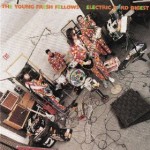
JM: The Young Fresh Fellows had an album that Butch Vig produced, Electric Bird Digest. What was that experience like?
SM: That was fantastic. I mean, Butch was incredible. We caught him just at the right time, before he got priced way out of our range [laughs]. He had two weeks between doing Gish, the Smashing Pumpkins record, and Nevermind by Nirvana. We did that record in the two weeks that he had in between doing those two records. We just had a blast. It was fantastic working with him, and Smart Studios was great. We had just a wonderful time in Madison, and I think he really, really enjoyed it.
In fact, he enjoyed it enough that we went back there for our next record and did like four songs with him, which he did for us for the same rate, which was insane because he was getting faxes the whole time we were there – we’d come in and it’d be The Cult offering him $100,000 to do their record [laughs]. It was super cool of him to still work with us after that. And we’re still friends. He’s a great musician and a very inspiring guy to work with. He’s super upbeat all the time, really positive and has a lot of fun when he’s recording. It was really fun, a good guy.
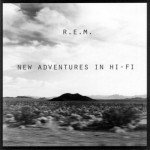
JM: Another big part of your resume is working with R.E.M. How did you get that gig, and do you think there’s any chance they’ll get back together sometime?
SM: [laughs] Well, I got the gig because I was friends with Peter. We just got to be friends over the years as you do traveling around playing in bars – the Indie Rock scene or whatever. Then he was spending time in Seattle when R.E.M. was finishing Automatic for the People, so we started hanging out a bunch. And then he met a woman here that he ended up marrying, so he came here and he and I started playing music together all the time, because there was a lot of downtime with R.E.M. They were doing records every couple of years.
In 1994, I didn’t have much going on. The Fellows weren’t really doing much. We slowed way down. R.E.M. was gearing up for the big Monster tour, and they needed another person so he asked if I’d be interested, and I said, “Yeah! Of course. It’d be amazing.” He wouldn’t have asked me if The Fellows were really busy, because he wouldn’t want to take me away from The Fellows, but since we weren’t really doing much I said yeah. So I went and tried out, and everybody seemed to like me OK, and 18 years later there I was, still. It was an amazing experience because I made all those great records with them, and touring everywhere all over the world. It was awesome. Such a good bunch of guys, and I’m still really good friends with all of them.
To answer your question about getting back together, I really don’t see it happening. I think R.E.M. doesn’t make decisions without putting a lot of thought into it, and I think they really felt like this was time – “We don’t need to do this anymore.” I’m sure they all miss it in a way, too, but I don’t think that they’ll go back and say, “Hey, let’s rev it up again.” I think everybody’s enjoying their lives now.
Peter’s started this little solo thing, making the solo records, and he still plays with The Baseball Project. Mike’s out playing with us all the time, and he’s been touring with Joseph Arthur as well. He’ll probably make a solo record one of these days. Michael’s really enjoying not being the frontman of a big rock band playing arenas I think [laughs]. That’s kind of a heavy weight to carry around with you, you know? And not having the pressure to write songs and all that stuff. I think he’s really enjoying the freedom just to do photography and sculpture and film, and all the other things that he’s still interested in.
And we see each other all the time. That’s the great thing. We hang out all the time. I’ve seen him as much as since we broke up – not as if we’re on tour or something, but we see each other very, very regularly. I always see Michael when we go to New York or Athens. I just hung out with him when we were in Athens rehearsing for the Baseball Project tour. Of course, I just spent six weeks in a van with Mike [laughs]. Peter, I hang out with all the time in Portland and Seattle. We play in so many different bands together, and he’ll play a few of these Baseball Project shows. He won’t be in Santa Barbara I don’t think, but I think he’s going to do Portland and Seattle. And then we’re going to go on tour with his band. I think we might play Santa Barbara in October or November. We’re touring with the Peter Buck Band opening for Alejandro Escovedo, and then we also back Alejandro, too. I think there might be a Santa Barbara show in that one, because it’s a pretty thorough Western United States tour. I think we’ll be in Santa Barbara too for that, so that’ll be great.
I don’t get to play Santa Barbara that often, and now it’s like I might play there three times in a year. I like it. With Jeff [Tweedy], it was intense. It was scary for me to get up in front of all those people, mostly by myself. I was lucky that Mikael Jorgensen [from Wilco] came and helped out with some songs, too. He lives sort of nearby now. That was a really fun gig, and I think this one will be really cool. And then if we come back with Peter and Alejandro, it’ll be fun, too. I don’t know where we’d play in that one. A nice little town you’ve got there.
JM: Going back to The Baseball Project, how far back do you and Steve go?
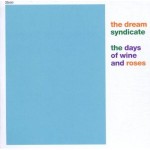
SM: Funnily, we didn’t really know each other until later on. Peter and Steve have known each other since the early 80’s. Actually, the first time I saw R.E.M., The Dream Syndicate was the opening band. That was in 1984. But I’d actually seen The Dream Syndicate before that. I’d seen them the year before in Seattle opening for U2. So I was a big fan of The Dream Syndicate. I liked them right from when that first record came out. But we didn’t really know each other until, I don’t know, maybe late ’90’s or something. I don’t know how we managed, because we had a lot of the same friends, and I’d seen Steve play a number of times, but somehow we didn’t really know each other. It’s kind of one of those things where we just assumed that we knew each other, but we think back and go, “I don’t think I really talked to you until you played The Crocodile in the 90’s”, or something like that. As far as the Indie Rock well-traveled musicians go, we’re relatively newer friends I guess [laughs]. We’re great friends now, and we certainly enjoy doing this baseball thing together. It’s awesome. And Steve’s wife Linda is just phenomenal. She’s a great person and an awesome drummer. She’s so much fun to play with. People will enjoy seeing her play, I’m sure.

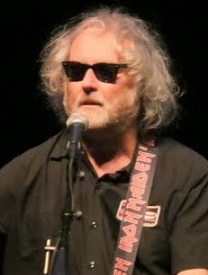
Really nice to read this article!